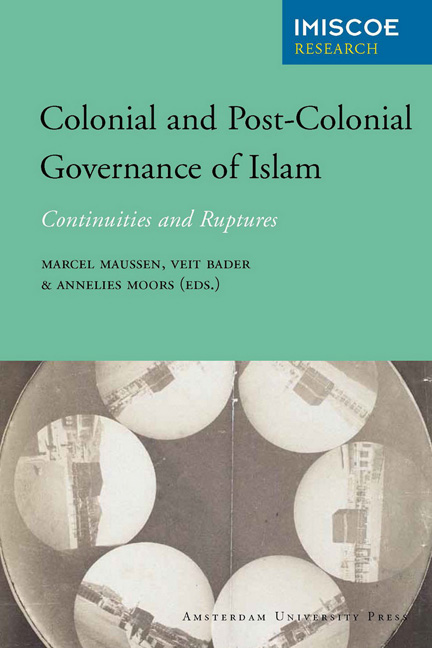12 - Conclusion
Published online by Cambridge University Press: 05 February 2021
Summary
The governance perspective as set out in our introduction can help to complement and alter government approaches that focus too much on formal policies and regulations and look at conflicts and encounters primarily at the level of the state. In these concluding remarks, we elaborate on five analytically distinct but overlapping foci of the governance perspective on colonial and post-colonial regulation of Islam. We use elements from the various contributions in this volume to demonstrate how and why this pre-theoretical framing helps to observe and analyse our empirical findings more adequately.
Questionable ‘stateness’ of colonial government and transnationalism
In our analysis of the authoritative regulation of Islam in colonial contexts, we need to be aware of the different forms of political power, institutionalised and otherwise. At the same time, we should not assume that there is a modern state in the sense commonly associated with stable and minimally coherent government, and we should keep looking at the transnational dimension of organised power and authority.
Despite the fact that Portugal's presence in Africa lasted for almost 400 years, Bonate (all author citations refer to their contributions in this volume unless specified otherwise) shows that it was not until the twentieth century that ‘a modern colonial regime was established’ with the goal of transforming Mozambican Muslims into colonial subjects. From 1895 onward, the Portuguese undertook failed campaigns of‘effective occupation’ - the Indigenato system, attempts to ‘Portugalise’ or ‘nationalise’ colonial subjects, and to control and domesticise Isläo negro - assuming full administrative and political control over the conquered territories. Until the late 1960s, however, Portuguese rule had no distinctively Muslim or Islam-oriented policies.
Leezenberg and Kanie not only point out the conceptual problems of applying ‘state’ to ‘pre-modern polities’ such as the Ottoman Empire (for the sultanates before British conquest in Malaysia, see also Meerschaut& Gutwirth this volume), they also demonstrate that British colonial dominance in Iraq ‘was relatively brief, erratic and by no means all-determining’.
Clancy-Smith shows that former practices, policies, ways of doing things and social arrangements of the Ottoman Regency in Tunisia from 1881 onward continued to have an impact on the French colonial regime.
- Type
- Chapter
- Information
- Colonial and Post-Colonial Governance of IslamContinuities and Ruptures, pp. 233 - 248Publisher: Amsterdam University PressPrint publication year: 2012



